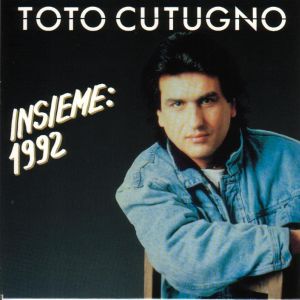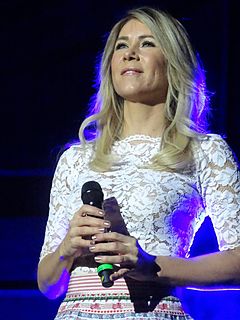
The Eurovision Song Contest 1990 was the 35th edition of the annual Eurovision Song Contest. It was held in Zagreb, SR Croatia, Yugoslavia, following the country's victory at the 1989 contest with the song "Rock Me" by Riva. It was the only time Yugoslavia hosted the contest. Organised by the European Broadcasting Union (EBU) and host broadcasters Yugoslav Radio Television (JRT) and Radiotelevision Zagreb (RTZ), the contest was held at Vatroslav Lisinski Concert Hall on 5 May 1990 and was hosted by Croatian television presenters Helga Vlahović and Oliver Mlakar. It was the first Eurovision Song Contest held in the Balkans as well as the first contest held in a communist or socialist state.

"Insieme: 1992" was the winning song of the Eurovision Song Contest 1990, in Zagreb, Yugoslavia, performed in Italian by Toto Cutugno for Italy, the country's second victory in the contest.
Austria participated in the Eurovision Song Contest 2005 with the song "Y así" written by Christof Spörk and Edi Köhldorfer. The song was performed by the group Global Kryner. The Austrian broadcaster Österreichischer Rundfunk (ORF) organised the national final Song.Null.Fünf in order to select the Austrian entry for the 2005 contest in Kyiv, Ukraine. Five artists and ten songs competed in a televised show where a public vote consisting of regional televoting and mobile phone voting exclusively selected "Y así" performed by Global Kryner as the winner.
Croatia participated in the Eurovision Song Contest 2005 with the song "Vukovi umiru sami" written by Franjo Valentić and Boris Novković. The song was performed by Boris Novković and Lado Members. Croatian broadcaster Croatian Radiotelevision (HRT) organised the national final Dora 2005 in order to select the Croatian entry for the 2005 contest in Kyiv, Ukraine. The national final consisted of three rounds: a quarter-final between 7 and 25 February 2005, two semi-finals on 12 and 13 March 2004 and a final on 14 March 2004. Twenty songs competed in the quarter-final and the top eighteen qualified to the semi-finals. Nine songs competed in each semi-final and the top seven qualified to the fourteen-song final. In the final, the combination of votes from a seven-member jury panel and a public televote selected "Vukovi umiru sami" performed by Boris Novković feat. Lado Members as the winner.
Croatia competed in the Eurovision Song Contest 1999, held in Jerusalem. The Croatian entry for the contest was Doris Dragović with the song "Marija Magdalena".
Sweden entered the Eurovision Song Contest 1990, held in Zagreb, Yugoslavia.
Greece and Ellinikí Radiofonía Tileórasi (ERT) chose to host a National Selection with the winner being chosen an "expert" jury. Christos Callow & Wave were chosen with "Horis skopo" and placed 19th at Eurovision.
For the Eurovision Song Contest 1990 in Zagreb, the song "Somewhere in Europe", written, composed and performed by Liam Reilly, was chosen to represent Ireland after it won the national final selection.
Finland participated at the Eurovision Song Contest 1990 held in Zagreb, Yugoslavia.
Germany and ARD used a national selection to select the entry for the Eurovision Song Contest 1990, with the winner being chosen by televoting. Chris Kempers and Daniel Kovac were chosen as the winners with the song "Frei zu leben".

Simone Stelzer alias Simone is an Austrian pop singer. She was born in Vienna, Austria on 1 October 1969.
Yugoslavia was the host nation of the Eurovision Song Contest 1990, held in Zagreb, SR Croatia, Yugoslavia. It was represented by Tajči and the song "Hajde da ludujemo"
Croatia entered the Eurovision Song Contest for the first time as an independent country in 1993. The country's first entry was by Put with the song "Don't Ever Cry".
The Netherlands was represented by Maywood, with the song "Ik wil alles met je delen", at the 1990 Eurovision Song Contest, which took place in Zagreb on 5 May.
Denmark was represented by Lonnie Devantier, with the song "Hallo Hallo", at the 1990 Eurovision Song Contest, which took place on 5 May in Zagreb. "Hallo Hallo" was chosen as the Danish entry at the Dansk Melodi Grand Prix on 24 March.
Germany was represented by mother and daughter duo Maxi and Chris Garden with the song "Lied für einen Freund", at the 1988 Eurovision Song Contest, which took place on 30 April in Dublin. "Lied für einen Freund", written by prolific Eurovision duo Ralph Siegel and Bernd Meinunger, was the winner of the German national final, held on 31 March. Maxi and Chris Garden had finished second in the 1987 German final.
Norway was represented by Ketil Stokkan, with the song "Brandenburger Tor", at the 1990 Eurovision Song Contest, which took place on 5 May in Zagreb. "Brandenburger Tor" was chosen as the Norwegian entry at the Melodi Grand Prix on 24 March. Stokkan had previously represented Norway in 1986.
Croatia participated in the Eurovision Song Contest 2001 with the song "Strings of My Heart" written by Tonči Huljić, Vjekoslava Huljić and Ante Pecotić. The song was performed by Vanna. Croatian broadcaster Croatian Radiotelevision (HRT) organised the national final Dora 2001 in order to select the Croatian entry for the 2001 contest in Copenhagen, Denmark. The national final took place on 4 March 2001. Twenty songs competed and a combination of votes from five regional juries, an expert jury, regional televoting and internet voting selected "Strune ljubavi" performed by Vanna as the winner. The song was later translated from Croatian to English for the Eurovision Song Contest and was titled "Strings of My Heart".
Turkey took part in the Eurovision Song Contest 1990. The country was represented by Kayahan with the song "Gözlerinin Hapsindeyim" written and composed by Kayahan.
Iceland was represented at the Eurovision Song Contest 1990 by Stjórnin with the song "Eitt lag enn". Stjórnin was the winner of the Icelandic national final, Söngvakeppni Sjónvarpsins 1990, organised by Icelandic broadcaster Ríkisútvarpið (RÚV).


